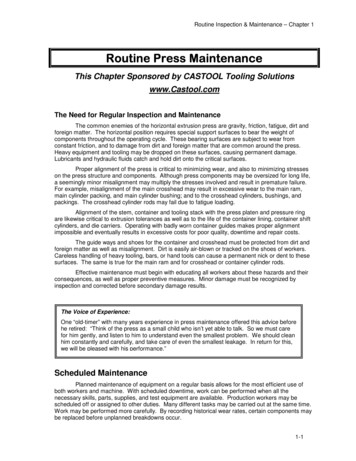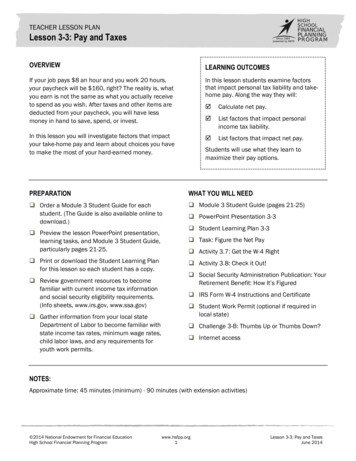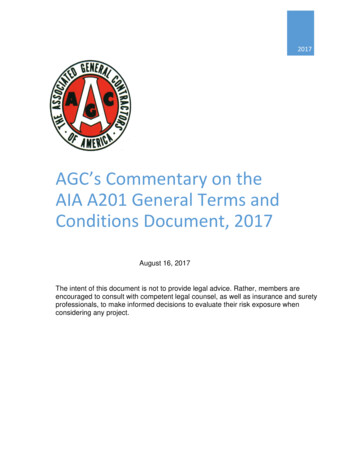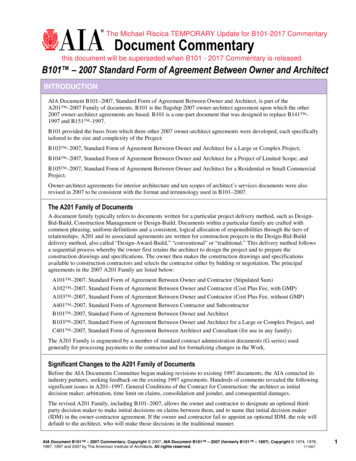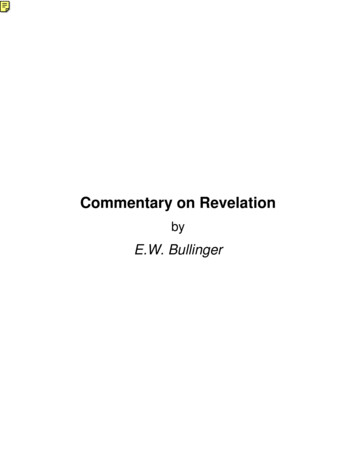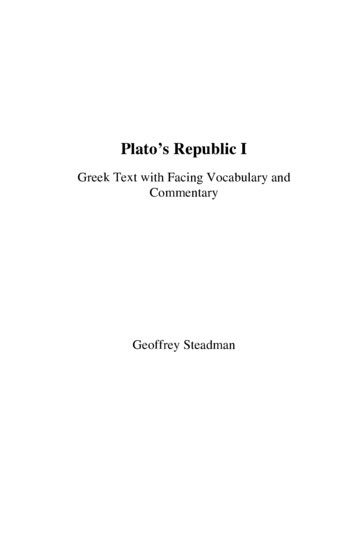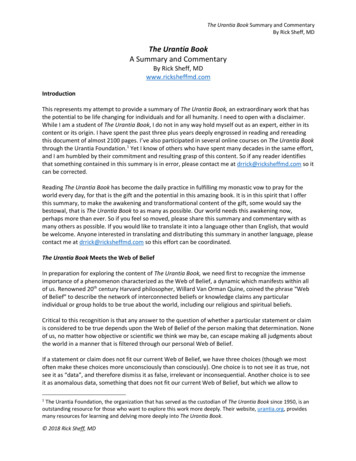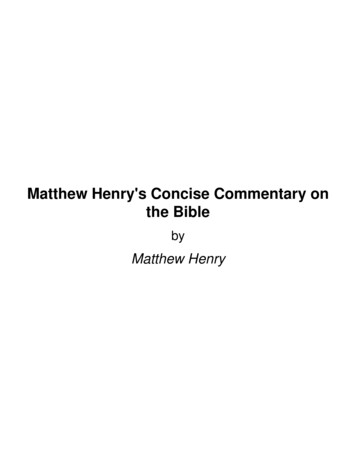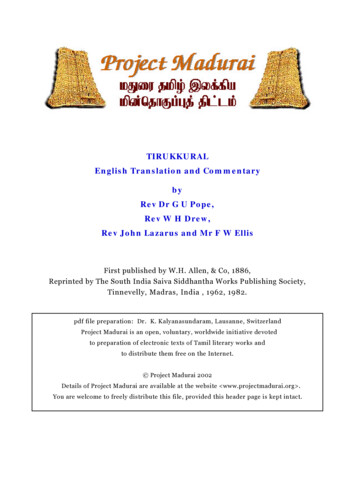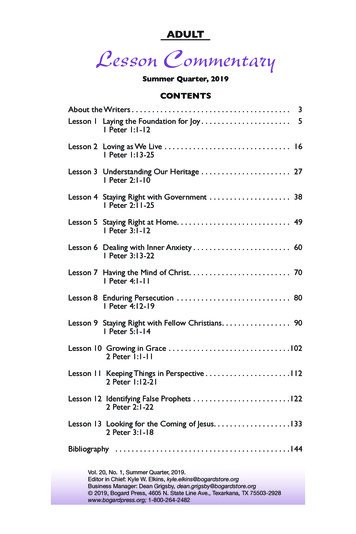
Transcription
ADULTLesson CommentarySummer Quarter, 2019CONTENTSAbout the Writers . . . . . . . . . . . . . . . . . . . . . . . . . . . . . . . . . . . . . .Lesson 1 Laying the Foundation for Joy . . . . . . . . . . . . . . . . . . . . .1 Peter 1:1-1235Lesson 2 Loving as We Live . . . . . . . . . . . . . . . . . . . . . . . . . . . . . . . . 161 Peter 1:13-25Lesson 3 Understanding Our Heritage . . . . . . . . . . . . . . . . . . . . . . . 271 Peter 2:1-10Lesson 4 Staying Right with Government . . . . . . . . . . . . . . . . . . . . . 381 Peter 2:11-25Lesson 5 Staying Right at Home . . . . . . . . . . . . . . . . . . . . . . . . . . . . 491 Peter 3:1-12Lesson 6 Dealing with Inner Anxiety . . . . . . . . . . . . . . . . . . . . . . . . 601 Peter 3:13-22Lesson 7 Having the Mind of Christ . . . . . . . . . . . . . . . . . . . . . . . . . 701 Peter 4:1-11Lesson 8 Enduring Persecution . . . . . . . . . . . . . . . . . . . . . . . . . . . . . 801 Peter 4:12-19Lesson 9 Staying Right with Fellow Christians . . . . . . . . . . . . . . . . . 901 Peter 5:1-14Lesson 10 Growing in Grace . . . . . . . . . . . . . . . . . . . . . . . . . . . . . . 1022 Peter 1:1-11Lesson 11 Keeping Things in Perspective . . . . . . . . . . . . . . . . . . . . 1122 Peter 1:12-21Lesson 12 Identifying False Prophets . . . . . . . . . . . . . . . . . . . . . . . . 1222 Peter 2:1-22Lesson 13 Looking for the Coming of Jesus . . . . . . . . . . . . . . . . . . 1332 Peter 3:1-18Bibliography . . . . . . . . . . . . . . . . . . . . . . . . . . . . . . . . . . . . . . . . . . . 144Vol. 20, No. 1, Summer Quarter, 2019.Editor in Chief: Kyle W. Elkins, kyle.elkins@bogardstore.orgBusiness Manager: Dean Grigsby, dean.grigsby@bogardstore.org 2019, Bogard Press, 4605 N. State Line Ave., Texarkana, TX 75503-2928www.bogardpress.org; 1-800-264-2482
SummerFall2019John 13—21Ezra; NehemiahHabakkuk; HaggaiMalachi; Esther1 Peter2 Peter1, 2, 3 JohnJude2020EzekielDanielZechariahRevelation 1—11Revelation 12—22Genesis 1—11Job2021Genesis 12—50Matthew 1—13Matthew HebrewsJoshuaJudgesRuth2023Acts 1—14Acts 15—281 Samuel2 Samuel 1—41 Chronicles 1 —10Mark 1—8Mark 9—162 Samuel 5—241 Chronicles 11—291 Kings 1; 2James1 Thessalonians2 ThessaloniansPsalms 1—72Galatians1 Kings 3—222 Chronicles 1—242 Kings 1—13Joel; Obadiah1 CorinthiansPsalms 73—150ProverbsEcclesiastesSong of SolomonLuke 1—13:21Luke 13:22—24Hosea; Amos;Micah; Jonah;2 Kings 14—162 Chronicles 25—282 CorinthiansIsaiah 1—392 Chronicles 29—322 Kings 17—20NahumIsaiah 40—662 Kings 21—232 Chronicles ians1 Timothy2 TimothyTitusJeremiahLamentations2 Kings 24; 252 Chronicles 36John 1—12202820272025Spring2026Winter2024American Baptist AssociationThrough-the-Bible Series Sunday School Lessons
About the WritersRecognized for their knowledge, wisdom and understanding of the HolyScriptures, the writers of the Adult Lesson Commentary are faithful pastors,teachers and spiritual leaders among the Lord’s churches. The following are afew biographical notes about these men.Dr. David Harris was born in Pine Bluff, Arkansas,in 1953. He was saved at age nine and baptized bythe authority of Harmony Missionary Baptist Churchwhere he surrendered to preach at age sixteen and waslater licensed and ordained.He graduated from Glendale High School in 1972and entered the Missionary Baptist Seminary in LittleRock the same year. He received his Bachelor, Masterand Doctorate Degrees in Bible Languages from theLittle Rock school.He has pastored the Pine Grove MBC near Holly Grove, Arkansas; HickoryRidge MBC of Hickory Ridge, Arkansas; Westlawn MBC of Texarkana, Texas;Calvary MBC of Van Buren, Arkansas; First Immanuel MBC of Pine Bluff,Arkansas; and presently serves the Temple MBC of Benton, Arkansas.He is a current member of the faculty of the Missionary Baptist Seminaryin Little Rock where he has taught for twelve years and where he serves asassistant editor of the Searchlight published by the Seminary.Before he began to write the Adult Lesson Commentary for New TestamentStudies, he had twenty years experience writing for Bogard Press and theBaptist Sunday School Committee. He has previously written Jr. High SundaySchool, Jr. High BTC and the Adult Quarterly.He may be contacted at drdavidharris@hotmail.com.Dr. Roger W. Stewart was born and raised in FortSmith, Arkansas, where he attended Central BaptistChurch throughout his entire childhood. He wassaved and baptized at age nine. At age seventeen, heannounced his call to preach before graduating fromNorthside High School in 1984. He soon found himselfa student at the Missionary Baptist Seminary wherehe earned a Bachelor of Theology degree in 1991.Meanwhile, Brother Stewart married Gena Ashlockin 1986 and was ordained to the gospel ministry by
Victory Missionary Baptist Church in Sherwood, Arkansas, later that sameyear. God blessed the Stewart’s with two boys—Brett in 1989 and Hayden in1991. After pastoring in Michigan for nine years, Brother Stewart returnedto Southeast Arkansas where he was afforded the opportunity to completehis Master of Theology (2006) and Doctor of Theology (2008) degrees at theMissionary Baptist Seminary.He is pastor of Olive Branch Missionary Baptist Church in Pine Bluff,Arkansas. He has served ABA churches in Holly Grove, DeWitt and Star City,Arkansas as well as in Coloma, Michigan. He is currently a member of theStanding Missionary Committee where he serves as Clerk. Brother Stewart isVice President of the Alumni Association for the Missionary Baptist Seminary.He may be contacted at drrwstewart@sbcglobal.net.Dr. Michael McCoy grew up attending BethlehemMissionary Baptist Church near Ola, Arkansas. He wassaved at the age of 13 and surrendered to the ministryin 1995 at the age of 19. Brother McCoy has pastoredLittle Elm Missionary Baptist Church in Farmington,Arkansas, since 1997. A graduate of the MissionaryBaptist Seminary in Little Rock, he also holds a BA inHistory and Classical Studies from the University ofArkansas as well as an MA and PhD in Ancient Mediterranean History from the University of Arkansas.He and his wife, Amy, married in 1998 and have twodaughters, Ava and Allison.He may be contacted at mtmccoy@gmail.com.
Lesson 1June 2, 2019Laying the Foundation for Joy1 Peter 1:1-12The question of Christian suffering has puzzled the righteous from timeimmortal. Why do God’s people have so many problems, especially when theyare trying to do right? The psalmist, Asaph, was confident that God was goodto Israel, but said, “But as for me, my feet were almost gone; my steps had wellnigh slipped. For I was envious at the foolish, when I saw the prosperity ofthe wicked. For there are no bands in their death: but their strength is firm.They are not in trouble as other men; neither are they plagued like other men”(Psalm 73:2-5). Asaph could not understand why the wicked were prosperingwhile the righteous were suffering. The same troubling question perplexed thegreat prophet Jeremiah. He decided he wanted to have a little talk with theLord about it and said, “Righteous art thou, O Lord, when I plead with thee:yet let me talk with thee of thy judgments: Wherefore doth the way of thewicked prosper? wherefore are all they happy that deal very treacherously?”(Jeremiah 12:1). Asaph learned the answer to his question when he later wentinto the house of the Lord and understood the end of the wicked (Psalm 73:1620). The Lord answered Jeremiah as well; his problems were only going to getworse, but the Lord would stand by him (Jeremiah 12:5-17).The apostle Peter’s letter to those who were suffering persecution in thefirst century serves as an answer to our own suffering in the present day. Peteradvised his readers not to be surprised by their suffering, but to be sure theywere suffering for the right reasons. He encouraged them to be strengthenedby the Word and to be an example of righteousness and holiness even in themidst of suffering and mistreatment. Peter set forth Jesus Christ as the greatest example of unjust suffering and how to respond to it. We are not going toget through this life without our share of suffering. We must not waste it, butuse it as an opportunity to sanctify the Lord God in our hearts and to be readyalways to give an answer to every man that asks for a reason of the hope thatis in us with meekness and fear (1 Peter 3:15). Unfortunately, some Christianssuffer for the wrong reasons. They are busybodies and evildoers. There is noglory in suffering for such ignoble reasons. Yet, when God’s children suffer forrighteousness sake, there is manifold glory to God and grace abundant.5
6 / 1 Peter 1:1-12The Author and the Audience (1 Peter 1:1)The customary style of first-century writers was to identify themselves andtheir intended audiences at the beginning of their letters. One practical reasonfor this was that they generally wrote on scrolls which were rolled up and sentto the reader. As the reader began to unroll the scroll, he could immediatelyidentify the author. Now we have return address labels and letterhead whichidentify us to the reader. Ordinarily, we wait until the end of the letter to sign it.The writers of the New Testament were inspired by the Holy Spirit towrite. The recipients, whether churches or individuals, were then aided by theHoly Spirit in their understanding.The Inspired Author. The inspired author of the letter known as 1 Peteridentified himself as, “Peter.” Peter was well known to the Christians andchurches of the first century. He was the one who preached on the day of Pentecost when three thousand were added to the church (Acts 2), and he was themost prominent church leader through the first half of the book of Acts.Peter had been a commercial fisherman before becoming a follower of JesusChrist. His hometown was Bethsaida (John 1:44), a city northwest of the Seaof Galilee in the fertile plain of Gennesaret. Bethsaida was nearby Capernaumwhich later became his home and later still served as the headquarters forJesus’ Galilean ministry. Peter was the brother of Andrew. Their father wascalled Jona (John 1:42). Peter’s given name was Simon. Jesus renamed himCephas (in Aramaic) or Peter (in Greek), meaning small rock.Peter and Andrew had been disciples of John the Baptist. We do not havea specific record of it, but were baptized by John. They were living with theexpectation of the soon coming Messiah. When Andrew personally heard Johnthe Baptist identify Jesus as the Lamb of God, he immediately found hisbrother, Simon (Peter), and said, “We have found the Messias, which is, beinginterpreted, the Christ. And he brought him to Jesus” (John 1:41, 42). WhenJesus saw Peter, He said, “Thou art Simon the son of Jona: thou shalt be calledCephas, which is by interpretation, A stone” (John 1:42).Peter further identified himself as “an apostle of Jesus Christ” (1 Peter1:1). Jesus chose the twelve after spending all night in prayer (Luke 6:12-16).In each listing of the apostles, Peter always heads the list. He was the mostprominent among them and oftentimes their spokesman. The apostles werespecial messengers of Jesus who were given “power against unclean spirits, tocast them out, and to heal all manner of sickness and all manner of disease”(Matthew 10:1).The Intended Audience. Peter wrote, “To the strangers scattered throughout Pontus, Galatia, Cappadocia, Asia, and Bithynia” (1 Peter 1:1). The term“strangers” is a rare word meaning “to stay in a place as an alien” (TDNT). Itdescribes a person “who for a period of time lives in a place which is not hisnormal residence” (Louw Nida 11.77). God’s people are strangers, or aliens, ina spiritual sense. This world is not our home. Our citizenship is in Heaven. Weare pilgrims passing through to a better land. While we are here, we will facehardships and even persecutions; nevertheless, we endure because we know
Laying the Foundation for Joy / 7what the future holds. We are somewhatlike Abraham of old, who “sojourned in the StrangersWord Study #3927land of promise, as in a strange country”(Hebrews 11:9).1 Peter 1:1. This adjective onlyThe word “scattered” is transliteratedoccurs three times in the entire Newdiaspora and “is used particularly [in] refTestament. It means a temporaryerence to the nation of Israel which hadresident. It is used only of believers whobeen scattered throughout the ancientnow have a heavenly citizenship but whoworld” (Louw Nida 15.137). We derive thecontinue to live temporarily as residentEnglish word dispersion from this word.aliens on earth.It “was a technical term for the Jews wholived outside of Palestine” (Wiersbe 10);however, the word does not suggest thatPeter was writing only to Jews. Internalevidence suggests some of his readerswere Gentiles who had been saved outof paganism (1 Peter 1:14, 18; 2:9, 10).Peter’s letter was a circular letterScattered Strangers (1 Peter 1:1):which would reach its intended audiPeter directed his letter to an audience of Christian Jews dispersed dueence “throughout Pontus, Galatia, Capto the persecution of Nero. With thepadocia, Asia, and Bithynia,” (1 Peterexception of Galatia, all others men1:1) regions in the northern and westerntioned by Peter were in the northernparts of Asia Minor. “The area coveredreaches of Asia Minor. James, in hisextends 300,000 square miles, which isvery Jewish way of thinking, actednearly all of Turkey” (Schreiner). “Ponsimilarly when he unified his auditus” was situated along the southernence by grouping all Jews under thecategory of “the twelve tribes whichcoast of the Black Sea. Aquila, the husare scattered abroad” (James 1:1). Inband of Priscilla, was born in Pontusdoing so, he suggested that all men(Acts 18:2). “Galatia” (1 Peter 1:1) layeverywhere were candidates for faithsouth of Pontus in central Asia Minor.in Jesus Christ. Of particular interestIt was divided into northern and southis that James neither divided Judeaern Galatia. Paul evangelized in southand Israel nor did he acknowledge,on any level, the ten lost tribes ofern Galatia in the cities of Antioch, IcoIsrael. This was akin to Paul’s intronium, Lystra and Derbe. “Cappadocia,”ductions when he used a Greeka large Roman province in eastern Asiaword, Grace and a Hebrew word,Minor, was generally east of Galatia andPeace to incorporate all men into hisnorth of Cilicia. “Asia” was immediatelyaudiences (1 Corinthians 1:3).east of the Aegean Sea. It was the mostinfluential of all these Roman provinces.It was established as a Roman province in 133 BC and occupied roughly thewestern third of modern-day Turkey. The early churches in Asia were Ephesus,Colossae, Laodicea, Philadelphia, Sardis, Thyatira, Pergamos and Smyrna. OnPaul’s second missionary journey he was prevented by the Holy Spirit fromgoing into Asia (Acts 16:6-8). “Bithynia” (1 Peter 1:1) was located in the northwest corner of Asia Minor. It was north of Asia and west of Pontus. Paul waslikewise forbidden by the Spirit to go into Bithynia on his second missionaryManna
8 / 1 Peter 1:1-12journey (Acts 16:7). It is likely the gospel made its way into these areas whilePaul was ministering in Ephesus (Acts 19:10).The one thing Peter’s wide audience had in common was that they weresuffering for their faith in Christ.The Work of the Trinity in Salvation (1 Peter 1:2)All three members of the Godhead are involved in the salvation of a soul:God the Father, the Holy Spirit and the Son, Jesus Christ. Salvation is thework of God not the work of man. No man can save himself, but God can saveany and every man who repents and believes the gospel. The invitation to salvation is universal. John wrote in the closing verses of the Bible saying, “Andthe Spirit and the bride say, Come. And let him that heareth say, Come. Andlet him that is athirst come. And whosoever will, let him take the water oflife freely” (Revelation 22:17). The Old Testament prophet, Isaiah, spoke in asimilar vein saying, “Ho, every one that thirsteth, come ye to the waters, andhe that hath no money; come ye, buy, and eat; yea, come, buy wine and milkwithout money and without price” (Isaiah 55:1). The gift of salvation is offeredto all men on the same terms of grace and faith. Paul wrote, “For by grace areye saved through faith; and that not of yourselves: it is the gift of God: not ofworks, lest any man should boast” (Ephesians 2:8, 9).Peter addressed his audience as, “Elect according to the foreknowledge ofGod the Father, through sanctification of the Spirit, unto obedience and sprinkling of the blood of Jesus Christ” (1 Peter 1:2). Notice the inclusion of all threepersons in the Godhead.Elect According to the Foreknowledge of God the Father. The word“elect” refers to that which has been chosen. It is used twenty-three times intwenty-three verses in the New TestamentElectand is translated chosen or elect. It is usedWord Study #1588of Israel, angels and of the saved in general. In this context all who have repented1 Peter 1:2. An adjective that meansof their sins and placed their faith in Jesuschosen or selected. In Peter’s language,Christ are elect. God’s foreknowledgeit often referred to things that were ofallows Him to know who will, and who willhigher quality such as choice fruit ornot, be saved. Yet, when it comes to ourchoice baskets.salvation, God’s foreknowledge does nottake away or overrule our will. His foreknowledge of our salvation does not predestinate our salvation. God has electedto save all who willingly repent and believe through the convicting of the Spirit.God’s foreknowledge will neither force anyone to be saved nor prevent anyonefrom being saved. No one will stand before God on judgment day and say, “Iwould have been saved, but you did not allow it.” Neither will anyone say, “Ireally did not want to be saved, but your Spirit forced me into it.”Through Sanctification of the Spirit. Election is “according to the foreknowledge of God the Father,” and “through sanctification of the Spirit.” TheHoly Spirit has a manifold work in salvation beginning with conviction. When
Laying the Foundation for Joy / 9people from Pontus, Cappadocia and Asiaheard the apostle Peter preach on the day Sanctificationof Pentecost, “they were pricked in theirWord Study #38heart, and said unto Peter and to the restof the apostles, Men and brethren, what1 Peter 1:2. This noun refers toshall we do?” (Acts 2:37). It was the Holysomething or someone that has beenSpirit who pricked their hearts. There candedicated or consecrated to God. Itsbe no salvation apart from the convictingEnglish equivalents would be holiness,work of the Spirit. Jesus said, “No manconsecration or sanctification.can come to me, except the Father whichhath sent me draw him” (John 6:44).The means by which the Father draws men unto Christ is by the workingof the Holy Spirit in convicting men of sin, righteousness and judgment (John16:7, 8). The Spirit brings conviction to those who hear the gospel message.It is not the preacher who convicts men of sin or who convinces them of thetrustworthiness of the gospel; it is the Holy Spirit who works in conjunctionwith the preached Word (1 Thessalonians 1:4-10). When the repentant sinnerbelieves on Christ, the Spirit does His wonderful work of regeneration and setsthe believer apart unto Christ.Unto Obedience and Sprinkling of the Blood of Jesus Christ. Theproper response to the convicting and convincing work of the Holy Spirit is toplace one’s faith in the finished work of Jesus Christ. It is possible to hear thegospel, be convicted and to feel sorrow for sin without taki
Little Elm Missionary Baptist Church in Farmington, Arkansas, since 1997. A graduate of the Missionary Baptist Seminary in Little Rock, he also holds a BA in History and Classical Studies from the Universi
